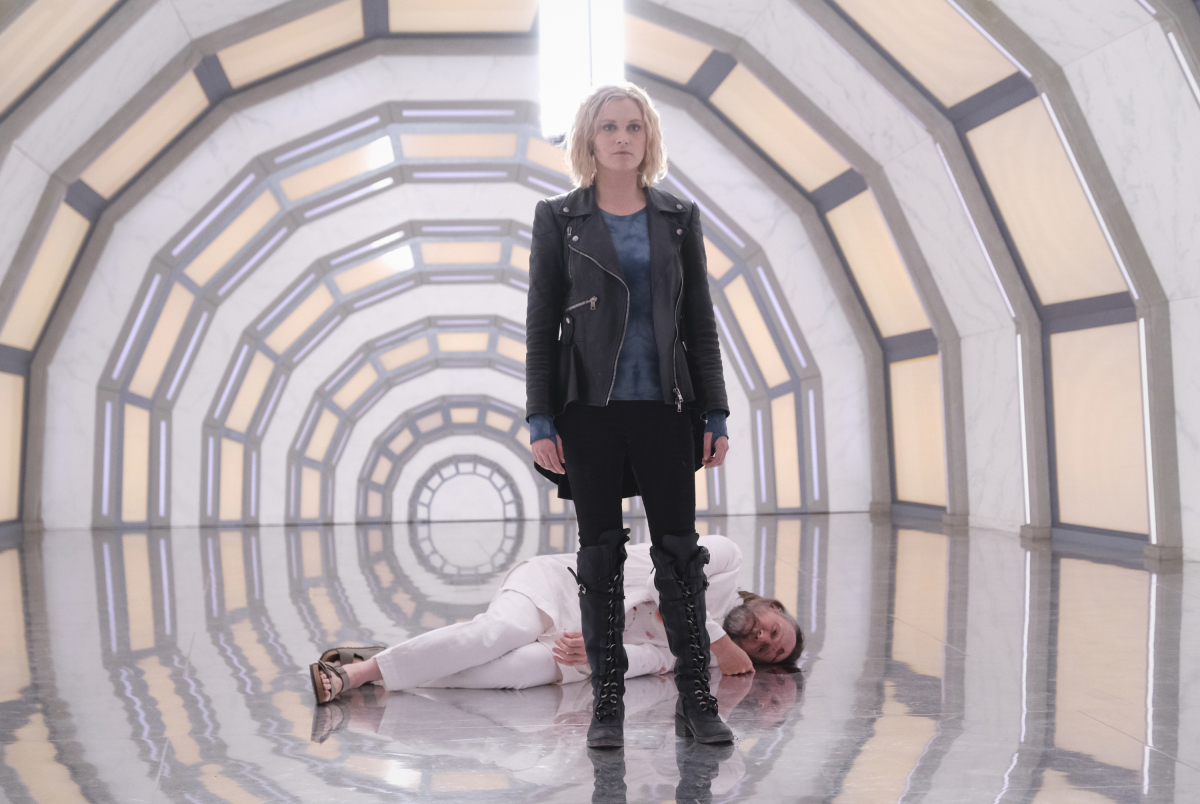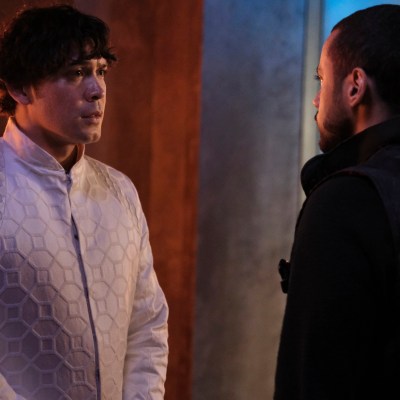The following contains MAJOR spoilers for the The 100 series finale.
There are several surprising moments during The 100 Season 7 finale, from Emori’s death to Octavia’s last-minute pep talk that stops humanity from killing itself, to the judgment that Clarke Griffin is be doomed to spend the rest of her days alone because she killed the monster who rendered her daughter unable to move or speak. (Eye-roll forever.)
However, the final hour’s most shocking revelation has to be the long-awaited return of fan favorite Alycia Debnam-Carey as Lexa. Well, sort of.
Before you get your hopes up, fandom, the real Lexa kom Trikru died in the Season 3 episode “Thirteen” and is still most sincerely dead as of the series finale. While Debnam-Carey does indeed return to on our screens in full commander garb and war paint, the woman in this episode isn’t actually Lexa at all. (And, to be honest, bears very little resemblance to her in the ways that count, if you ask me.)
Instead this false Lexa is merely a form chosen by the leader of the unidentified, vaguely celestial beings charged with determining whether humanity – and all other species, apparently – has done enough to merit the next “evolutionary leap,” whatever that means. Turning into glowy stick people, it looks like, before joining consciousness with… something in the great beyond. The rules of transcendence are kind of a mess.
Read more
The details of it all are more than a little fuzzy, but it generally seems to be a net good for the species in question, and if it isn’t heaven, exactly, it’s certainly not hell. There are rules, however— only those who are still alive at the moment of transformation are allowed to transcend (Sorry, Bellamy. Sucks that you were right all along, I guess!) And the form of the celestial “judge” is both important and specific to the one who is taking the test on behalf of their species or people.
For Bill Cadogan, the judge appears in the form of his daughter Callie. For Raven, it’s Abby Griffin. And, for Clarke, it takes the form of Lexa. Because of course it does.
“We most often take the form of the subject’s greatest teacher or the source of their greatest failure…or can be their greatest love,” the being who appears as Callie tells Cadogan.
For Clarke, Lexa pretty much encompasses all of those things. And as such, her reappearance here is a beautiful nod to the important role she did – and still does – play in Clarke’s life. The chemistry between the pair still crackles, and there’s a certain catharsis in seeing Debnam-Carey and Eliza Taylor share the screen with each other one more time before the final credits roll.
Yet, the moment also rings terribly hollow. Because this isn’t Lexa, and forcing a god-judge to wear her face in The 100’s final moments certainly doesn’t make up for the horrific way the show chose to kill her character off in the first place. It’s not closure, not really at all, and certainly not in any way that counts. Her surprise return feels like nothing so much as baiting the fandom with the one thing they’ve asked for repeatedly over the past four years – only giving it to them in precisely the worst way possible.
Yes, The 100 fans finally get to see Lexa – and Clexa – together again. But this Lexa is a dark pseudo-villain that’s willing to hang the literal end of humanity around Clarke’s neck, as just one more burden for her to carry. She’s removed and alien and missing so much of the key warmth that made Lexa who she was – this is the idea of a character more than anything like an actuality, and while that Clexa hug felt great to watch, it is also an illusion. It’s the scraps of a woman and a relationship that used to be – and this character deserves better than that. (And so do all her fans.)
Though, perhaps this really is the ending we deserve in this hell year. Clarke has been such a cipher and general nonentity this season that this reunion really only even works at all because the Clexa relationship has literal years’ worth of nostalgia and history to draw on. That’s not giving the fans closure in any real way – that’s relying on them to do the work for you, and to draw connections and make meaning where none has been provided. And that honestly kind of sucks.
But, really, more power to those who found some degree of happiness in Lexa’s pseudo-return. With so much of this series finale left to viewer interpretation—Is the ending a happy one? Is it a good thing that most of humanity chose to opt-out of the work of actually living in a real corporeal way? What does transcendence mean? Who are these beings anyway?—there’s a certain choose-your-own-adventure feel to proceedings that leave fans free to decide for themselves what they want to take away from this story. And in that way, perhaps Lexa kom Triku really does live again, after all.


